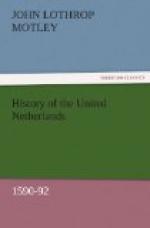To the student of military history the campaigns and sieges of Maurice, and especially the earlier: ones, are of great importance. There is no doubt whatever, that the youth who now, after deep study and careful preparation, was measuring himself against the first captains of the age, was founding the great modern school of military science. It was in this Netherland academy, and under the tuition of its consummate professor, that the commanders of the seventeenth century not only acquired the rudiments, but perfected themselves in the higher walks of their art. Therefore the siege operations, in which all that had been invented by modern genius, or rescued from the oblivion which had gathered over ancient lore during the more vulgar and commonplace practice of the mercenary commanders of the day was brought into successful application, must always engage the special attention of the military student.
To the general reader, more interested in marking the progress of civilisation and the advance of the people in the path of development and true liberty, the spectacle of tho young stadholder’s triumphs has an interest of another kind. At the moment when a thorough practical soldier was most needed by the struggling little commonwealth, to enable it to preserve liberties partially secured by its unparalleled sacrifices of blood and treasure during a quarter of a century, and to expel the foreign invader from the soil which he had so long profaned, it was destined that a soldier should appear.
Spade in hand, with his head full of Roman castrametation and geometrical problems, a prince, scarce emerged from boyhood, presents himself on that stage where grizzled Mansfelds, drunken Hohenlos, and truculent Verdugos have been so long enacting, that artless military drama which consists of hard knocks and wholesale massacres. The novice is received with universal hilarity. But although the machinery of war varies so steadily from age to age that a commonplace commander of to-day, rich in the spoils of preceding time, might vanquish the Alexanders, and Caesars, and Frederics, with their antiquated enginery, yet the moral stuff out of which great captains, great armies, great victories are created, is the simple material it was in the days of Sesostris or Cyrus. The moral and physiological elements remain essentially the same as when man first began to walk up and down the earth and destroy his fellow-creatures.
To make an army a thorough mowing-machine, it then seemed necessary that it should be disciplined into complete mechanical obedience. To secure this, prompt payment of wages and inexorable punishment of delinquencies were indispensable. Long arrearages were now converting Farnese’s veterans into systematic marauders; for unpaid soldiers in every age and country have usually degenerated into highwaymen, and it is an impossibility for a sovereign, with the strictest intentions, to persist in starving his soldiers and in killing them for feeding themselves. In Maurice’s little army, on the contrary, there were no back-wages and no thieving. At the siege of Delfzyl Maurice hung two of his soldiers for stealing, the one a hat and the other a poniard, from the townsfolk, after the place had capitulated. At the siege of Hulst he ordered another to be shot, before the whole camp, for robbing a woman.




